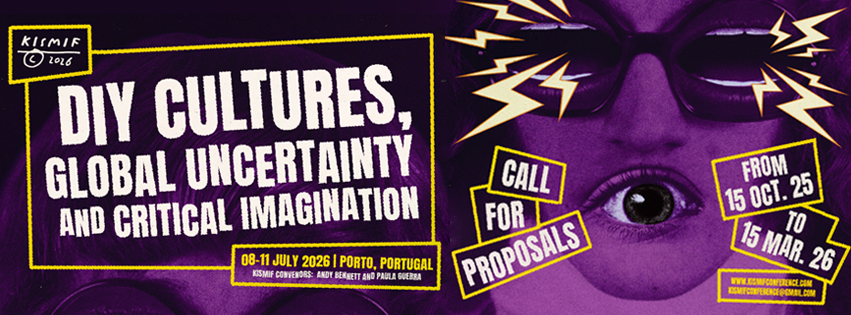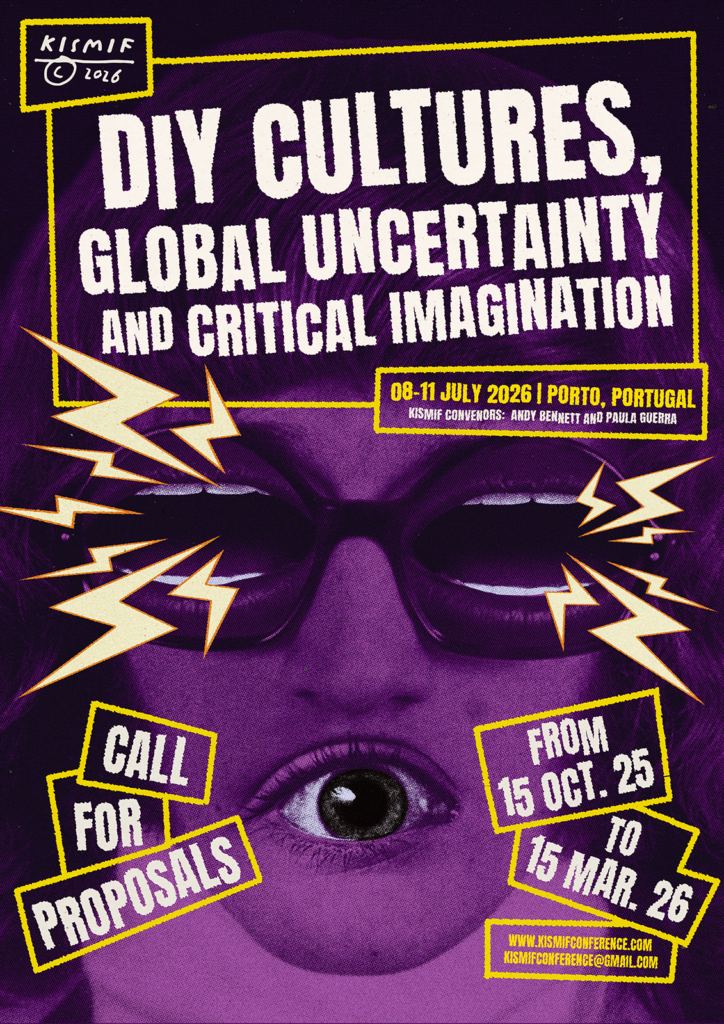From 15 October 2025 to 15 March 2026
We are pleased to announce the eighth edition of the KISMIF INTERNATIONAL CONFERENCE ‘DIY Cultures, Crisis and Critical Imagination’ (KISMIF 2026) which will take place in Porto, Portugal, between July 07 and 11 of 2026. The submission of abstracts for this Conference is open to researchers, academics, activists and artists working in all areas of sociology, anthropology, history, cultural economics, cultural studies, geography, philosophy, urban planning, media and cognate disciplines such as design, illustration, popular music, film, visual and performing arts. This initiative follows the great success of the past seven KISMIF Conferences (held in 2014, 2015, 2016, 2018, 2021, 2022 and 2024) and brings together an international community of researchers, artists and activists focusing on alternative music-art scenes and do-it-yourself cultures. As such KISMIF 2026 will serve as a pivotal occasion of reunion and critical imagination around the societal fragmentation shaped by the multiple crises we are experiencing on an unprecedented scale.
The KISMIF CONFERENCE 2026 provides a unique forum in which participants can discuss and share knowledge about alternative cultures and DIY practices from around the world. KISMIF focuses on cultural practices often opposed to more conventional, mass-produced and commodified forms of cultural production and mediation and the anti-hegemonic ideologies around aesthetic and lifestyle politics that are typically embedded in DIY culture. KISMIF is the first, and to date only Conference in the world that examines DIY culture theory and practice as an increasingly significant form of cultural practice in a global context marked by uncertainties and risks. The conference has a multi-/transdisciplinary approach, accepting contributions from academics, artists and activists involved in all aspects of alternative scenes and DIY cultures, and based on various methodologies – quantitative, qualitative, and multi-methodological approaches. The aim is to discuss not only music, but also other artistic fields such as cinema and video, graffiti and street art, theatre and performing arts, literature and poetry, radio, programming and editing, graphic and web design, illustration, cartoons and comics.
Seeking to respond to the wish reiterated by researchers, artists and activists present at previous editions of the KISMIF Conference, the eighth edition of KISMIF will focus on ‘DIY Cultures, Crisis and Critical Imagination’.
Since the beginning of the new millennium, the world has been plunged into a deepening series of uncertainties and risks, spanning economic, environmental and, more recently, pandemic threats to the stability of nations around the world. Amidst these rapid changes, we have witnessed increasing waves of war, social unrest and increasingly extremist policies adopted by national governments to contain and subvert protest and various forms of activism.
In the contemporary landscape, DIY Cultures have (re)emerged as vivid expressions of collective agency and resilience. Rooted in practices of making, repairing, re‑imagining, these cultures challenge consumerist and passive modes of cultural production. Tightly intertwined with this resurgence of DIY is the concept of the civic imagination, i.e., the collective capacity to envision other possible worlds and enact them through participatory cultural practice. Defined as the ability to imagine alternatives to existing social, economic, and political arrangements, civic imagination is increasingly central to how communities respond to crisis. Parallel to these developments, feminist makerspaces have emerged as sustained, politically anchored sites of innovation and solidarity. These makerspaces demonstrate that DIY is not merely about tools or outputs but about embedding egalitarian values into everyday organizational forms and practices.
Considering the intensifying polycrisis that is now characteristic of the contemporary global conjuncture — encompassing political authoritarianism, environmental degradation, economic instability, forced migrations and digital platformisation of social life — the topic of DIY Cultures, crisis, and critical imagination emerge as a critical domain for sociological, cultural and political inquiry. Theorizations of civic imagination and collaborative futures emphasize their dual function: the capacity to envision alternative socio-political arrangements, and the capacity to perceive oneself and one’s community as active agents in realizing them. This resonates strongly with traditions in cultural sociology that position grassroots cultural production as both a symbolic and material practice of resistance.
Recent empirical studies on feminist and community-led makerspaces and on hackathons for social good demonstrate just how DIY Practices constitute imagination infrastructures, i.e., socially embedded networks of resources, narratives, skills and relationships that sustain collective capacities to respond to crises through creative and participatory research. In this perspective, DIY cultures are not only opposed to dominant ways of cultural production but also function as prefigurative politics, enacting alternative modes of governance, economic exchange and social (re)production. Furthermore, scholarship in critical cultural geography and media studies has shown that these practices operate across scalar configurations, which means from hyperlocal interventions in public space to transnational digital collaborations, thereby expanding the terrains in which civic imagination can be mobilized. Within contexts of democratic backsliding, the intersection between aesthetic experimentation, cultural activism and technological affordances opens pathways for counter-hegemonic cultural citizenship.
Within this framework, DIY Cultures operate as dynamic laboratories of social innovation, particularly effective in contexts of institutional failure or policy inertia as we see nowadays in several countries, such as Portugal. For instance, grassroots media collectives have emerged in urban peripheries to document environmental injustices, using low-cost open-source tools to gather and disseminate evidence of pollution, illegal dumping, or climate-related hazards. Such initiatives not only address immediate informational gaps but also catalyze civic engagement by reframing environmental issues as matters of collective responsibility and civil rights. Similarly, post-disaster community rebuilding projects, such as citizen-led reconstruction of cultural spaces following natural catastrophes, demonstrate the adaptability of DIY Networks in mobilizing resources, knowledge, and emotional resilience beyond formal aid channels.
Several authors have investigated the democratization of the technological design process in low-resource communities through the creative reuse of e-waste. Based on the data, the researchers identified three key factors: balancing personal and community needs, valuing convenience and productivity, and redefining sustainability and social connectedness. This study shows how DIY Practices act as an infrastructure for collective imagination, creating meaningful and contextual technologies as a proactive response to socio-environmental crises. The Department of Civil Imagination project, organized within the framework of the RESHAPE network, has also conceived an imaginary and collaborative laboratory through which artists, researchers, and activists come together to reimagine civic space and post-crisis futures. This initiative, in turn, exemplifies how DIY culture can be a catalyst for transformative civic imagination, operating in institutional interstices. In line with the theoretical spectrum, Henry Jenkins dedicated himself to the concept of civic imagination, under the lens of youth participatory politics and, finally, the concept of critical imagination and the concept of critical imagination. in short, redefining ways to participate and imagine new forms of democracy.
Moreover, the critical imagination embedded in DIY Practices can also be understood through participatory urban interventions that prefigure alternative futures. Examples include temporary, collectively built public installations that reclaim privatized or abandoned spaces for cultural and social use, effectively challenging dominant narratives of urban development and gentrification. Moreover, feminist makerspaces often function as both skill-sharing environments and political collectives, integrating workshops on coding, repair, or sustainable fabrication with dialogues on gender justice and anti-capitalist critique. On the digital front, collaborative online platforms for artivism have facilitated transnational solidarity campaigns, linking artists, activists, and researchers in coordinated responses to authoritarian crackdowns or cultural censorship. In each of these cases, the act of making becomes inseparable from the act of imagining otherwise, thus producing tangible artefacts, spaces, and narratives that disrupt existing orders while modelling inclusive and sustainable alternatives.
In recent years, artivism has become a defining strand of DIY Cultural Practice in times of crisis. Whether through street murals reclaiming gentrified neighborhoods, guerrilla performances exposing climate inaction, or digital interventions disrupting state-controlled narratives, artivism operates at the intersection of cultural production and political agency. What we have seen is that artivism is a practice, thus an ethos and a praxis that transform public space into a site of contestation and possibility, enabling communities to express dissent while envisioning alternative futures. As an inherently DIY form of critical imagination, artivism resists the commodification of culture and bypasses institutional gatekeepers, often operating on minimal budgets and through horizontally organized networks. It thrives in moments of instability because it reframes crisis not as a dead end, but as a space for aesthetic and political invention. By combining symbolic disruption with collective authorship, artivism embodies the ethos of DIY and that of DIT, enhancing that creativity and citizenship are inseparable.
In 2026, KISMIF’s scientific programme will again be accompanied by a diverse offering of social and cultural contents, characterized by a series of artistic events with a special focus on the critical imagination and citizenship. The aim is to provide a unique experience in terms of transglobal and inclusive DIY Cultures and Critical Imagination. The KISMIF Conference 2026 will be preceded by a Summer School entitled ’Clash the future! CTRL + ALT + RIOT’ that will take place July 7th 2026 at the Batalha Centro de Cinema [Batalha Centre for Cinema]. This Summer School will offer the opportunity to all participants, including Conference delegates, to attend workshops given by experts in different fields such as critical imagination but not exclusively. Information about the Summer School will be progressively disseminated on the KISMIF Conference website: www.kismifconference.com
Click on the image below to see the full Call for Papers:


